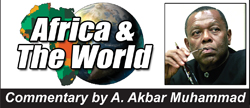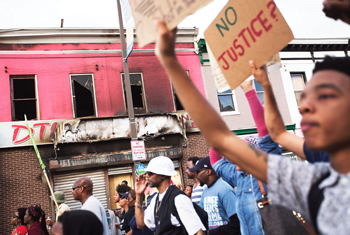Thugs and Criminals - Poor Word Choice For Resisters
By A. Akbar Muhammad | Last updated: May 7, 2015 - 10:48:18 AMWhat's your opinion on this article?

|
The Most Honorable Elijah Muhammad said that history is best qualified to reward all research. Our young people are expressing their frustration at a system that targets, criminalizes and violates them daily. To call them thugs and criminals while they resist tyranny, because of the destruction and loss of property, is to contradict America’s own foundation and history.

Demonstrators march, May 2, in Baltimore. Chants of “no justice, no peace, no racist police” echoed through the streets of Baltimore during a march that organizers billed as a “victory rally” a day after a prosecutor charged six officers involved in the arrest of a man who died in police custody. Photo: AP Wide World Photo/David Goldman
|
I am sure if one asked George III his view of the resistance in the colonies—in particular the Boston Tea Party—he would refer to the resisters as criminals and thugs. Ironically like his modern day counterparts in the United States government, criminalizing the victims of tyranny and injustice gave excuse for further mistreatment.
Would those who readily call young Black resisters thugs and criminals say the same to those involved in the Boston Tea Party in the 1770s, which history shows was an act of rebellion and a major lead up for them realizing justice and separation from the throne? It was destruction of property when colonists physically interfered with the unbalanced economic arrangement imposed on the colonies by George III. When they raided ships of imported tea and dumped the shipments in the Boston Harbor causing loss of revenue, were these White Founding Fathers rebelling or rioting?
President Obama, Baltimore Mayor Stephanie Rawlings-Blake—who later retracted her words—and others who mischaracterized young Blacks as “thugs” while they are expressing legitimate grievances, must consider American history. History informs us about how rebellion to injustice and tyranny is part of the fabric of America. On the other hand the same America perpetrates thuggish and criminal acts worldwide and domestically for the most part on people of color.
In Baltimore like other recent cases where the people rose up in the streets, the plea of the authorities and some Black leaders is for peace, but absent in their call is the most important part which is justice.
We have every right to designate those who commit criminal acts against our people as thugs and criminals. The deaths of Freddie Gray, Michael Brown in Ferguson, Eric Garner in New York, Walter Scott in South Carolina, Eric Harrison in Oklahoma, 12-year-old Tamir Rice in Cleveland and John Crawford in an Ohio Wal-Mart expose the thuggish and criminal element in U.S. police departments and a culture of cover-up that protects police who in many cases are guilty of murder.
Mayor Rawlings-Blake was bold enough to clarify her misuse of the word thug, referring to our people. These young people are our babies. In a recent twitter post, the Honorable Minister Louis Farrakhan said, “There is fear in America over our young people coming together,” and he called them “the finest generation we have ever had—and because they are the finest generation, they are under attack.”
The system created the circumstances and social-political climate where justice and a better quality of life have been denied. Every generation was met with the struggle to overcome the systemic injustices of their time. During the civil rights, Black power and liberation era, disrupting business as usual was always a tactic to push for meaningful change. America must evaluate its relationship with the Black and the poor domestically if it will have a future as a power globally. This is a time of decision for America.
The Boston Tea Party rebellion against George III planted the seeds for revolution and the establishment of a new nation that became the United States of America. It was the decisive moment of history between an oppressor and the oppressed wherein George III words “the colonies must either submit or triumph.”
This October 2015, on the occasion marking the 20th anniversary of the Million Man March, Minister Farrakhan will lead a mass of people to Washington, D.C., to issue a demand to the government of the United States for “Justice or Else.” We are at the same critical juncture that our former slave-masters were with King George, either continue to submit to the tyranny or triumph with self-determination in a nation of our own.
To the young people who have no fear of the militarized police forces, the National Guard or any agents of suppression, you are not the thug. You are instruments of liberation from the thugs and the criminals.
To the older and more fearful, “You have always hoped for a generation that would stand up to the forces of injustice and oppression that we in former years bowed down to,” said Minister Farrakhan in another twitter posting. Here they are.
(For questions and comments reach A. Akbar Muhammad at [email protected].)
INSIDE STORIES AND REVIEWS
-
-
About Harriett ... and the Negro Hollywood Road Show
By Rabiah Muhammad, Guest Columnist » Full Story -
Skepticism greets Jay-Z, NFL talk of inspiring change
By Bryan 18X Crawford and Richard B. Muhammad The Final Call Newspaper @TheFinalCall » Full Story -
The painful problem of Black girls and suicide
By Charlene Muhammad -National Correspondent- » Full Story -
Exploitation of Innocence - Report: Perceptions, policies hurting Black girls
By Charlene Muhammad -National Correspondent- » Full Story -
Big Ballin: Big ideas fuel a father’s Big Baller Brand and brash business sense
By Bryan Crawford -Contributing Writer- » Full Story






 Click Here Stay Connected!
Click Here Stay Connected!








